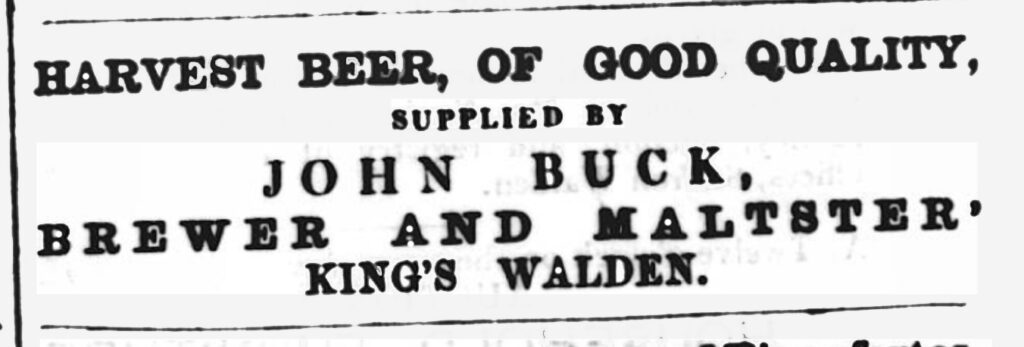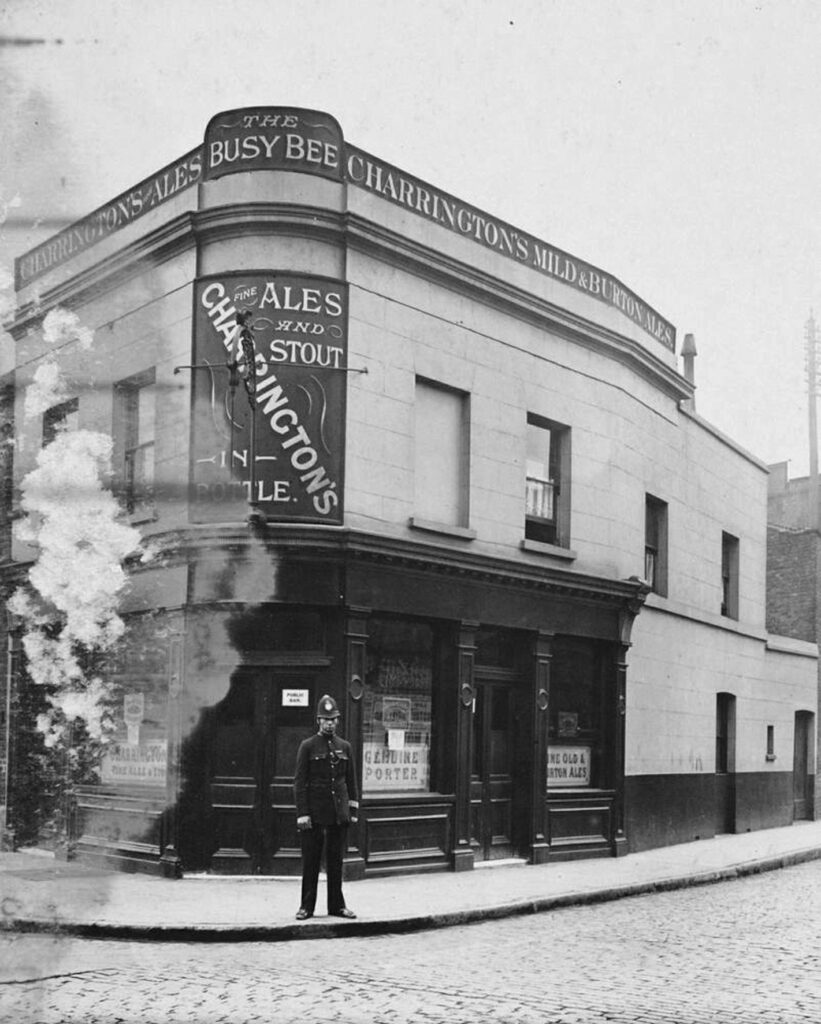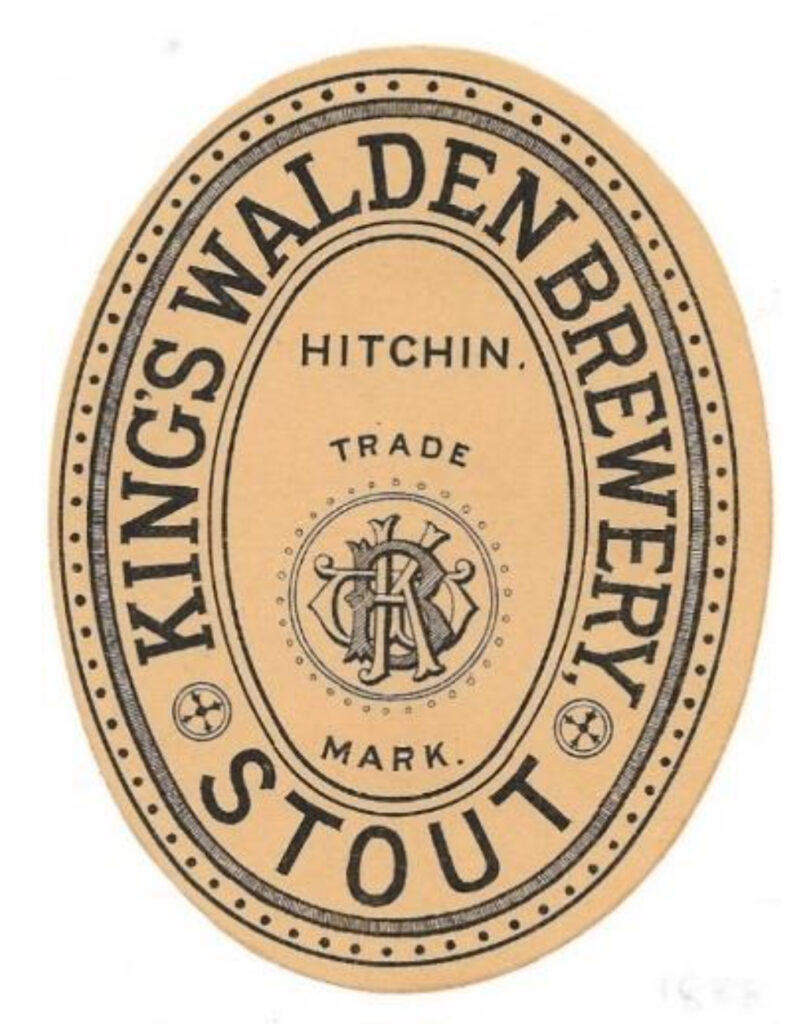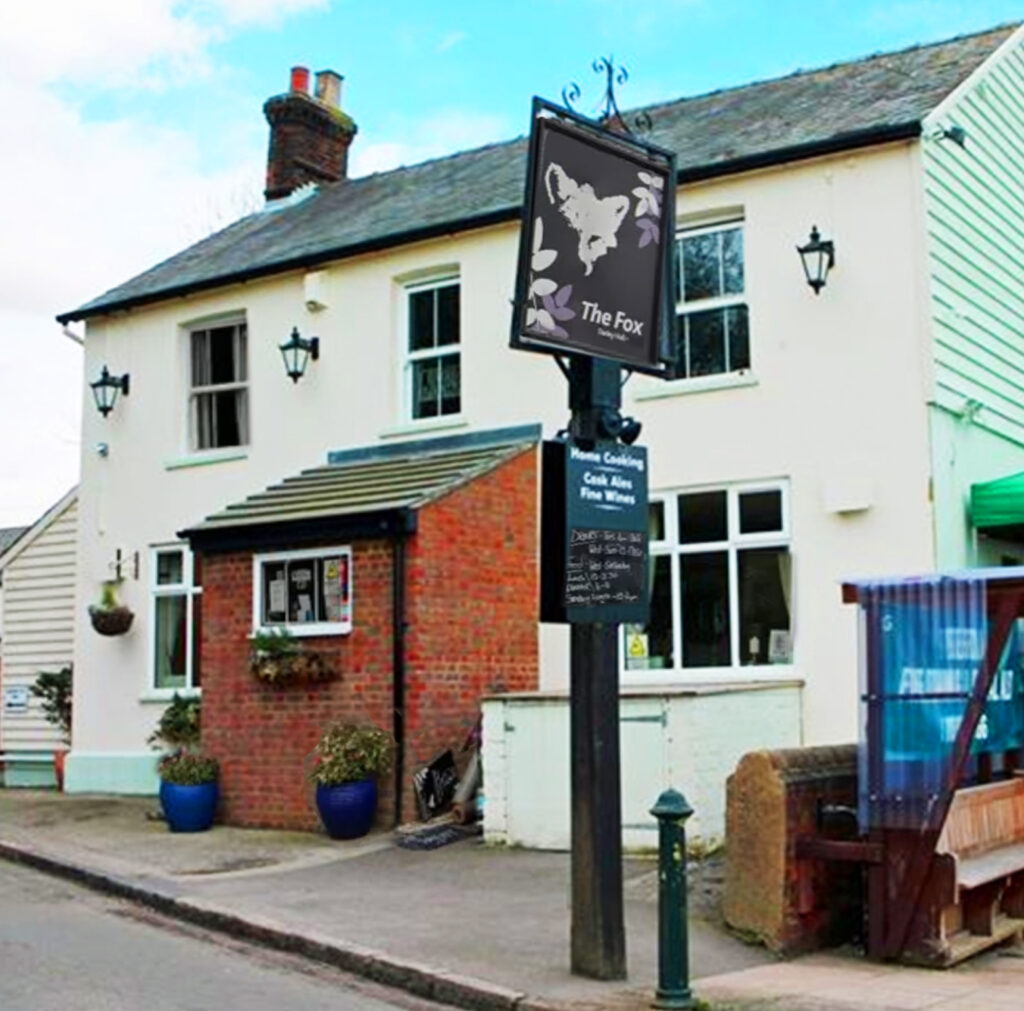Frederick William Fellowes was born in Beighton, between Norwich and Yarmouth in Norfolk, in 1856, one of the 10 children of the Reverend Thomas Lyon Fellowes. Several of his brothers, like their father, entered the church. But in 1872 an older sister, named Pleasance, married Edward Jesser Coope, only son of Octavius Edward Coope, a partner in Ind Coope. Edward Coope was working at Ind Coope’s Burton upon Trent brewery by 1878, and Frederick used his connection to Edward to train as a brewer in Burton.
In 1881 Frederick, then 25, was living with his sister and her husband at their home, Grace Dieu Manor House, near Coalville, some 12 miles east of Burton. (Through their mother, Frederick and Pleasance were cousins of Alice Liddell, immortalised as the Alice of Alice in Wonderland by Lewis Carroll, and Alice was one of the bridesmaids at Pleasance and Edward’s wedding.)
Frederick’s brother Alfred married Annette Hinds, daughter of William Hinds and his wife Rebecca Briggs Hinds, of Byfleet Lodge, Byfleet, Surrey. Hinds, who was born in 1832, was descended from a family of slave-owning sugar plantation proprietors in Barbados, and a wealthy man. (One of his relatives was a former Bishop of Norwich, which would explain how the Hinds and Fellowes families knew each other.) Alfred died in 1883, but the following year William Hinds appointed another brother, the Reverend Henry Cecil Fellowes, as his personal chaplain, at a salary of £500 a year (equivalent to £55,000 today).
In 1885, Hinds bought the King’s Walden Bury estate in North Hertfordshire, which included the 250 acres of King’s Walden Park and another 2,500 or so acres including 12 different farms, and two inns, the Fox at Frogmore (a hamlet frequently called “Fogmore” in the 19th century), immediately to the east of King’s Walden Park, and the Queen’s Head at nearby Breachwood Green, as well as “numerous” cottages and smallholdings.
The Fox had its own brewery, and a small 23-acre farm attached. It had been run in 1832 by Samuel Wilmott, a farmer in King’s Walden, who died in 1835, and then by John Buck. Born 1807, John was the son of Josiah Buck of Frogmore. His uncle, also called John Buck, was butler to William Hale of King’s Walden Bury. The 1841 census describes John Buck the younger as a brewer at Frogmore.
He was not the only one: Henry Hampton, 32, was also listed as a brewer in Frogmore, undoubtedly at the Jolly Sailor beerhouse in Frogmore End. In September 1850, however, the brewing plant at the Jolly Sailor beerhouse in “Fogmore”, including a 108-gallon (three-barrel) copper with furnace underneath, a fir cooler 16 feet by four feet, a seven-barrel working tun, 21 casks of various sizes from firkins to barrels, 11 iron-bound pipes (casks of 108 gallons each), four pipes of beer, “eight bushels to the pipe” (implying an OG or 1065 or 1070) and “a capital iron-armed Dung Cart”, were put up for auction “By order of Mr Henry Hampton”. The following year’s census showed Hampton as only a beer shop owner.

John Buck, in the same census, was called a “brewer and victualler” at “Fogmore”. In 1855 Buck bought a beerhouse on the western side of the parish, at Darley Hall, the year after the death of its owner, Samuel McDonnell. Samuel had been born around 1807 in County Armagh, had married a local girl, Mary Titmuss, aged 26, from King’s Walden, in 1839, and was described as a tea dealer at Darley Hall in 1841. McDonnell was a beer retailer as well at Darley Hall by 1851 at the latest. (William Branch Johnson’s Hertfordshire Inns says the earliest mention of the Fox at Darley Hall was in 1806, when Daniel Young was the licensee: this is very unlikely to be correct, as it was a beerhouse, and thus would not have been licensed before 1830. Perhaps Young was at the Fox, Frogmore, which DID have a full licence.)
Buck was malting as well as brewing (and quite possibly growing his own barley), since he described himself as “brewer and maltster” when he advertised in the Hertfordshire Express in June 1861 a supply of “Harvest beer, of good quality”.
Eventually the Darley Hall beerhouse, too, became known as the Fox. Eventually, also, in 1868, John Buck married Mary McDonnell. Buck died just three years later, however, in 1871, and Mary, now 58, took over running the brewery, the farm and the Fox at Frogmore, while one of her sons, William, ran the Fox at Darley Hall. In 1881 Mary was being helped out at the brewery and pub by her youngest son, Thomas McDonnell. Thomas was at the Three Mallards pub in Hitchin by 1882, and Mary handed over the licence at the Fox to William Walsingham in December 1883, dying two years later, in 1885. Walsingham was still at the Fox in 1886, but by 1890 it looks to have closed.
What appears to have happened is that Frederick Fellowes, now in his early 30s, his brother the Reverend Henry Fellowes and William Hinds had decided that the operation at the Fox could be the basis for Frederick setting up in business as a brewer in his own right. A surviving receipt from Thornewill and Warham of the Ironworks, Burton on Trent to Messers Hinds, Fellowes and Fellowes of the King’s Walden Brewery dated 21 June 1888 covered virtually everything necessary to start a brewery, from a malt mill through the mash tun (with sparger and false bottom) to the copper (with steam coil), the hop back and the refrigerator for cooling the hot wort. The total, including a vertical steam engine and boiler, came to £648/19/7d, plus carriage of £13/2/- and travelling expenses of £6/1/-, equivalent to around £80,000 today.
The business was running by August that year, with surviving receipts from that month showing sales to customers in King’s Walden and neighbouring St Paul’s Walden. A surviving note of sales from November that year shows purchases by the Blacksmith’s Arms beerhouse in Pirton, a village five miles to the north, and other customers in Pirton and Shillington, another couple of miles further on across the border into Bedfordshire.
A rent accounts ledger for the brewery held at Hertfordshire Archives shows the Fox at Frogmore still open, and the brewery also having the Jolly Sailor at Frogmore End as one of its tied houses. In October 1899 the King’s Walden brewery opened a store in Manchester Street, in the centre of Luton which ran until at least September 1890. A few months later, in February 1890, the brewery seems to have begun leasing the Busy Bee beerhouse in St Dunstan’s Road, Stepney, 30 miles from King’s Walden, from Charrington’s brewery in Mile End, East London. The King’s Walden brewery paid Charrington’s £15 3s 3d to have ten signs painted for the inside and outside of the Busy Bee announcing its ownership.

Around the time the brewery opened, another brother, Commander Charles James Fellowes, a retired Royal Navy officer, moved into the district, so that he and his family were living at Lane House, Ley Green, about a mile from Frogmore, by the time of the 1890 Kelly’s directory.
William Hinds died in April 1890 (he is buried in St Mary’s Church, King’s Walden), leaving all his property to his wife, Rebecca Briggs Hinds. Nine months later, in January 1891, it was announced in the Brewers’ Journal that Frederick Fellowes, the Reverend H.C. Fellowes and R. B. Hinds, “under the style of the King’s Walden brewery, King’s Walden are dissolving their partnership.”
This seems not to have been the immediate end of the brewery, however: when the census taker came round three months later, on April 5 1891, Reuben Woodward was a working brewer aged 37, born Denstone, Staffordshire, living at the Brewery House, Fogmore (sic) with his family, including a son and daughter aged seven and six born in Burton on Trent and another son aged 11 born Marchington, Staffs, where his wife was from. Nearby, at “Fogmore End”, was Joseph James Wood, brewer’s assistant, aged 23, born Whitwell (a village just two miles away) and his wife Mary Jane, born in Uttoxeter, Staffordshire, a town 100 miles from King’s Walden, but, perhaps significantly, just ten miles from Burton upon Trent. Frederick Fellowes was living at Park House, King’s Walden, his occupation still given as “brewer”.
However, in August 1891 the entire brewery plant was put up for sale, consisting of “six-quarter mash tun, iron liquor backs, hop back, two fir squares, open wort, copper gauge, 26 barrels liquor, wort pumps, steam engine and machinery, tubular boiler, Lawrence’s masher, sparger and refrigerator, pipes and cocks, wood, iron and brickwork, cleansing and travelling casks, stillions, hop and yeast presses, bottling and corking machines and various loose effects, four horses, drays and harness, beer in cask and bottles, hops and sundry stock.” That really does seem to mark the end of the brewery, after barely three years.

A couple of months before that, perhaps significantly, in June 1891, King’s Walden Bury itself, and the almost 3,000-acre estate attached to it, including, presumably, the land the brewery stood on, had been sold to a Liverpool shipping owner, Thomas Fenwick Harrison, for more than £100,000, more than £11 million today. (Harrison had the Bury pulled down in the next couple of years and rebuilt to an Elizabethan-style design by the architects Frederick Beeston and John William Stanley Burmester. The new house lasted less than 70 years, before it, too, was replaced by Harrison’s great-grandson, the extravagantly-named Sir Thomas Henry Milborne-Swinnerton-Pilkington, 14th Baronet, with a neo-Palladian-style building designed by Raymond Erith and Quinlan Terry in 1969-71.)
Frederick Fellowes seems to have continued to live in the Kings Walden area, and in 1894 he married Emily Sowerby, whose family owned the nearby estate of Putteridge Bury. (The Sowerby family crest of a lion “rampant argent” gave its name to the Silver Lion pub in Lilley, the next-door village). The couple clearly moved in aristocratic circles: guests at the wedding included three earls, two eldest sons of earls, one younger son of a duke, three viscounts, two barons and nine baronets.
Fellowes went on to be one of a number of British entrepreneurs who invested in American breweries in the 1890s and 1900s: he was on the board of the Bartholomay Brewing Company of Rochester, New York in 1900, and chairman of the company by 1913, and by 1907 he was also a director of the San Francisco Breweries Ltd, an amalgamation of nine Northern Californian concerns. Fellowes was still on both companies’ boards when Prohibition arrived in 1919.
He was living at his brother’s old home, Lane House, King’s Walden, in 1901, and still living there when he died in August 1928. Frederick and his wife had a son, Reginald William Lyon Fellowes, born 1895, who won the MC and bar in the First World War as a major in the Royal Field Artillery and a CBE while serving as a colonel in the Royal Artillery in Persia and Iraq in the Second World War. Reginald ended his army service as a brigadier.
(With thanks to Keith Osborne for his research on the brewery’s history)




Google sadly reports The Fox as permanently closed. I’m pretty sure i went there in the early 2000’s when the restaurant was specialising in pies. Sad if it really has closed.
Thank you – yes, it appears to have closed in November 2021, according to its Facebook page. Post now corrected.
Very interesting I wonder how many hectolitres were put out a year by the brewery.
Very interesting. Don’t forget the Butler Fellowes at Stevenage, who I think was related.
All the best,
Hugh Madgin
Hi, Hugh, good to hear from you … yes, they were very possibly related, “Admiral and Mrs Fellowes” were among the many guests at Freerick William Fellowes’s marriage to Emily Sowerby in 1894.
[…] an apology to Martyn whose story of the King’s Walden Brewery was published on September 23rd but went unmentioned last week. I note it now for many reasons […]